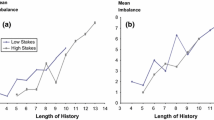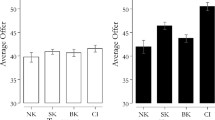Abstract
Several non-experimental studies claim that heterogeneity among individuals reduces trust. A few experimental studies have examined the effects of naturally-occurring differences among subjects on trusting behavior, and in contrast, most have not supported these claims. We adopt a novel approach by inducing heterogeneity among subjects in a canonical trust experiment. We accomplish this by varying the show-up payments given to subjects for participating in the experiment. We find that this induced inequality does not consistently affect first- or second-mover behavior in the classic trust game in the manner predicted by either previous theoretical work or empirical studies of survey-based measures of trust. Further, the effect of inequality on trust, in terms of both sign and significance, depends on whether show-up payments are awarded publicly or privately.
Similar content being viewed by others
References
Alesina, A., & La Ferrara, E. (2002). Who Trusts Others? Journal of Public Economics, 85(2), 20—34
Anderson, L. R., Mellor, J. M., & Milyo, J. (2004a). Inequality and Public Good Provision. Working Paper Number 12, Department of Economics, The College of William and Mary
Anderson, L. R., Mellor, J. M., & Milyo, J. (2004b). Social Capital and Contributions in a Public Goods Experiment. American Economic Review Papers and Proceedings, 94(2), 373—376
Armantier, O. Do Wealth Differences Affect Fairness Considerations? Forthcoming in the International Economic Review
Ashraf, N., Bohnet, I., & Piankov, N. (2006). Decomposing trust. Working Paper, Department of Economics, Harvard University
Ball, S., Eckel, C., Grossman, P. J., & Zame, W. (2001). Status in markets. Quarterly Journal of Economics, 116(1), 161—188
Baumeister, R. F., Stillwell, A. M., & Heatherton, T. F. (1994). Guilt: an interpersonal approach. Psychological Bulletin, 115(2), 243—267
Berg, J., Dickhaut, J., & McCabe, K. (1995). Trust, Reciprocity, and Social History. Games and Economic Behavior, 10, 122—142
Bouckaert, J., & Dhaene, G. (2004). Inter-Ethnic Trust and Reciprocity: results of an Experiment with Small Business Entrepreneurs. European Journal of Political Economy, 20(4), 869—886
Burks, S. V., Carpenter, J. P., & Verhoogan, E. (2003). Playing both roles in the trust game. Journal of Economic Behavior and Organization, 51(2), 195—216
Chan, K. S., Mestelman, S., Moir, R., & Muller R. A. (1996). The Voluntary Provision of Public Goods Under Varying Income Distributions. The Canadian Journal of Economics, 29, 54—59
Chan, K. S., Mestelman, S., Moir, R., & Muller, R. A. (1999). Heterogeneity and the Voluntary Provision of Public Goods. Experimental Economics, 2(1), 5—30
Cochard, F., Van, P. N., & Willinger, M. (2004). Trusting behavior in a repeated investment game. Journal of Economic Behavior and Organization, 55(1), 31—44
Coleman, J. (1990). Foundations of Social Theory. Cambridge, MA:Harvard University Press
Costa, D., & Kahn, M. (2003). Civic Engagement and Community Heterogeneity: an Economist’s Perspective. Perspectives on Politics, 1(1), 103—111
Cox, J. C. (2004). How to Identify Trust and Reciprocity. Games and Economic Behavior, 46, 260—281
Fershtman, C., & Gneezy, U. (2001). Discrimination in a Segmented Society: an Experimental Approach. Quarterly Journal of Economics, 116(1), 351—377
Fehr, E., Fischbacher, U., von Rosenbladt, B., Schupp, J., & Wagner, G. G. (2003). A Nation-Wide Laboratory: Examining Trust and Trustworthiness by Integrating Behavioral Experiments into Representative Surveys. IZA Discussion Paper No. 715
Glaeser, E. L., Laibson, D. I., Scheinkman, J. A., & Soutter, C. L. (2000). Measuring trust. Quarterly Journal of Economics, 115(3), 811—846
Goeree, J., & Holt, C. (2000). Asymmetric Inequality Aversion and Noisy Behavior in Alternating-Offer Bargaining Games. European Economic Review, 44, 1079—1089
Hassebrauck, M. (1986). Ratings of distress as a function of degree and kind of inequity. Journal of Social Psychology, 126, 269—270
Johansson-Stenman, O., Martinsson, P., & Mahmud, M. (2005). Trust, Trust Games and Stated Trust: evidence from rural Bangladesh, Working paper, Goteborg University
Koford, K. (2001). Trust and reciprocity in Bulgaria: A replication of Berg, Dickhaut and McCabe. Working paper, University of Delaware
Maximiano, S., Sloof, R., & Sonnemans, J. (2004). Gift exchange in a Multi-Worker Firm. Tinbergen Institute Discussion Paper, TI 2004-100/1
Ostrom, E., & Walker, J. (2003). Trust and Reciprocity: Interdisciplinary Lessons from Experimental Research. New York: Russell Sage Foundation
Putnam, R. (2000). Bowling Alone: The Collapse and Revival of American community. New York: Simon and Schuster
Roth, A., Prasnikar, V., Okuno-Fujiwara, M., & Zamir, S. (1991). Bargaining and Market Behavior in Jerusalem, Ljubljana, Pittsburgh, and Tokyo: An Experimental Study. American Economic Review, 81(5), 1068—1095
Tocqueville, A. (1945). Democracy in America. New York: Alfred A. Knopf. Originally published in 1835
Wilkinson, R. G. (1996). Unhealthy Societies: The Afflictions of Inequality. Routledge (New York, New York)
Willinger, M., Keser, C., Lohmann, C., & Usunier, J.-C. (2003). A comparison of trust and reciprocity between France and Germany: Experimental investigation based on the investment game. Journal of Economic Psychology, 24, 447—466
Zak, P., & Knack, S. (2001). Trust and growth. The Economic Journal, 111 (April), 295—321
Author information
Authors and Affiliations
Corresponding author
Additional information
JEL Classification C9, Z13
Rights and permissions
About this article
Cite this article
Anderson, L.R., Mellor, J.M. & Milyo, J. Induced heterogeneity in trust experiments. Exp Econ 9, 223–235 (2006). https://doi.org/10.1007/s10683-006-9124-2
Received:
Revised:
Accepted:
Issue Date:
DOI: https://doi.org/10.1007/s10683-006-9124-2




